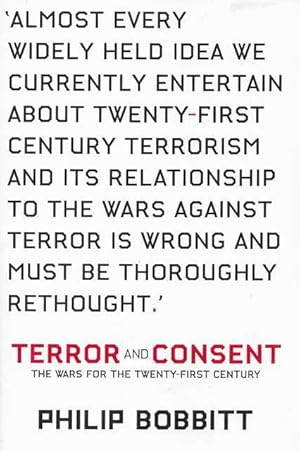‘The wars against terror have begun, but it will take some time before the nature and composition of these wars is widely understood. The objective of these wars is not the conquest of territory, or the silencing of any particular ideology, but rather to secure the necessary environment for states to operate according to principles of consent and make it impossible for our enemies to impose or induce states of terror.’
The threat of terrorism is now part of the landscape of daily lives all over the world, yet we have hardly begun to think properly about it. Terror and Consent argues that, like so many states and civilizations in the past which suffered defeat, we are fighting the last war, with weapons and concepts which were useful to us then but which have now been superseded. This book aims to provide a fundamental rethinking of most generally accepted ideas about terror in the modern world – what it is, how it operates and above all how it can be frustrated. Philip Bobbitt argues that we need to reforge the links which previous societies have made between law and strategy; to realize how the evolution of modern states, which have always produced terrorists in their own image, has now produced a globally networked terrorism that will change as fast as we can identify it; to combine humanitarian interests with strategies of intervention; and above all to rethink what ‘victory’ in such a war, if it is a war, might look like – no occupied capitals, no treaties, no victory parades, but the preservation, protection and defence of states of consent. It is central to his argument that we must fight terror and not just terrorists.
Bobbitt addresses questions about the nature and uses of intelligence, the apparently intractable persistence of torture, whether it is permissible for states to curtail citizens’ freedoms in order to protect them and the role of the United States in the world with boldness and originality. His solutions will be controversial to many, and will surely provoke re-evaluation in most of his readers. This is one of the most challenging and wide-ranging books of any kind about our modern world.
Philip Bobbitt has served as a senior adviser at the White House, the Senate and the State Department in both Democratic and Republican administrations, and has held senior posts at the National Security Council, including Director for Intelligence Programs and Senior Director for Strategic Planning. He holds the Walker Chair in constitutional law at the University of Texas. He has been Anderson Senior Research Fellow at Nuffield College, Oxford, where he was a member of the Oxford Modern History Faculty, and Marsh Christian Senior Fellow of War Studies at King’s College, London. He is a member of the American Academy of Arts and Sciences and has written books on nuclear strategy, social choice and constitutional law, as well as the celebrated The Shield of Achilles (Allen Lane/Penguin 2002). He lives in Austin, New York and London.
